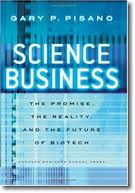 As part of a class I took on biotech, we were assigned to read Science Business by Gary Pisano. I learned a lot from the class and this book, and it really answered a question I've had for a long time: Why does science/medicine move so much more slowly than technology in general? I learned that the biotech industry as a whole has been barely profitable since its inception, and that there is a severe productivity crisis (productivity as defined by cost per successful drug has been dropping over time, which is very different from something like computer processors which have been dropping in price over time). There is a big "valley of death" between discovery of a compound or process and commercialization. It takes 10 years and $1 billion to get a drug to market, and 1 in 5,000 drugs makes it. WHOA. People are always optimistic about biotech revolutionizing health, and it hasn't lived up to this potential yet. The book explains many reasons for this and suggests some different approaches and solutions, none of which seems easy or straightforward. My full notes are below. I'm curious to see how the industry evolves in the future, as many lives could be saved and improved if things change drastically. I. Preface: The rise of a new industry and a big question a. Big hopes but disappointing financial returns over time b. Biotech firms not more productive in R&D than big pharma c. Fundamental business problems created by science d. Functional requirements of sector; performance comes from how well it’s managing these (poorly) i. Risk management ii. Integration iii. Learning e. Monetizing IP leads to bad info flow, fragmentation, proliferation of new firms f. Biotech can’t just adopt same methods as high-tech g. Can sci be a biz? h. Some businesses doing basic sci; some universities treating sci like biz (selling IP, starting co’s) i. 30 year history of biotech sector data analyzed II. Ch. 1: the science-based business: a novel experiment a. Biotech is convergence of 2 separate realms b. Science biz one that tries to advance sci, not just use it c. Sci biz needs unique mgmt d. Sector profits near zero historically e. Different norms, values, metrics between sci and biz f. 3 main factors i. Profound and persistent uncertainty => needs risk rewarding and mgmt 1. Long time horizons for risk to be resolved 2. Appropriability: ability of biz to capture value from an asset 3. Openness vs. secrecy ii. Complex and heterogenous nature of scientific knowledge => needs integration 1. Cross disciplinary iii. Rapid progress => cumulative learning Part 1: The Science of the business I. Ch. 2: mapping the scientific landscape a. Locks and keys b. Random screening c. rDNA d. mAb e. combinatorial chem f. SNPs g. Proteomics h. RNA interference i. RDD j. HTS k. Growing size, complexity, heterogeneity II. Ch. 3: the complex anatomy of drug R&D a. Can save or kill you b. So much still unknown c. So many places where drug can work wrong d. Target identification and validation: find enzyme e. Lead identification and optimization: find molecule to inhibit it f. Preclinical development: check safety and effectiveness before humans g. Human clinical trials phases 1-3 h. Reg approval III. Ch. 4: drug R&D and the organizational challenges a. Not like processor design; very little knowledge about entire system and overall spec b. Process very complex and can’t be broken into pieces: uncertainty and integrality c. Most R&D on losers d. Active ingredient and formulation both matter e. New scientific advances increase uncertainty; show more what we don’t know f. More choice means more uncertainty g. More advances mean harder integreation Part 2: The business of the science I. Ch. 5: the anatomy of a science-based business a. Many separate technologies b. Cyclical entry c. Genentech started industry i. Close links to universities ii. Biz model innovation: contract w/ big pharma for funding development of drug and royalties in exchange for manufacturing and marketing rights 1. First time pharma did R&D through external for-profit co iii. Pursuit of broad range of opportunities/diseases d. Second generation used more chemistry and focused on research, allowing pharma to commercialize e. Third gen: human genomics, industrialized R&D, platform strategy f. Market for know-how i. More collab w/ biotechs than w/ univ II. Ch. 6: the performance of the biotech industry: promise vs. reality a. Long lag times b. Zero industry profits c. Huge skews for Amgen and Genentech d. R&D productivity, revenue-adjusted III. Ch. 7: monetizing IP a. Txr of IP from univ -> private new firms b. Capital markets (VC) and public equity c. Market for know-how (small firms trade IP for funding from big firms) d. Go public much earlier for funding i. Only 20% of public co’s today have ANY product on market, so basically R&D entities ) (GAAP not as useful) e. Univ research -> startup w/ VC -> IPO for more funding -> license to big co to bring to patient f. 3 requirements for risk mgmt. i. Many options for diversification ii. Adequate info iii. Abilty to reap reward g. Market for know-how -> integration i. But biotech less modular and codified than software ii. IP protection murky IV. Ch. 8: organizational strategies and business models a. Few examples of success, high uncertainty, luck plays big role b. Financing critical for industry and its main measure, but wrong measure because it’s input, not performance c. Alliances/IP monetization are important but not endgame d. Movie studio model for big pharma: produce ideas of independent writers V. Ch. 9: The path ahead a. Venture philanthropy b. Rethinking the publicly held biotech firm (doesn’t match 10 year investment cycle)
0 Comments
Your comment will be posted after it is approved.
Leave a Reply. |
Archives
June 2024
Categories
All
Subscribe |
 RSS Feed
RSS Feed
